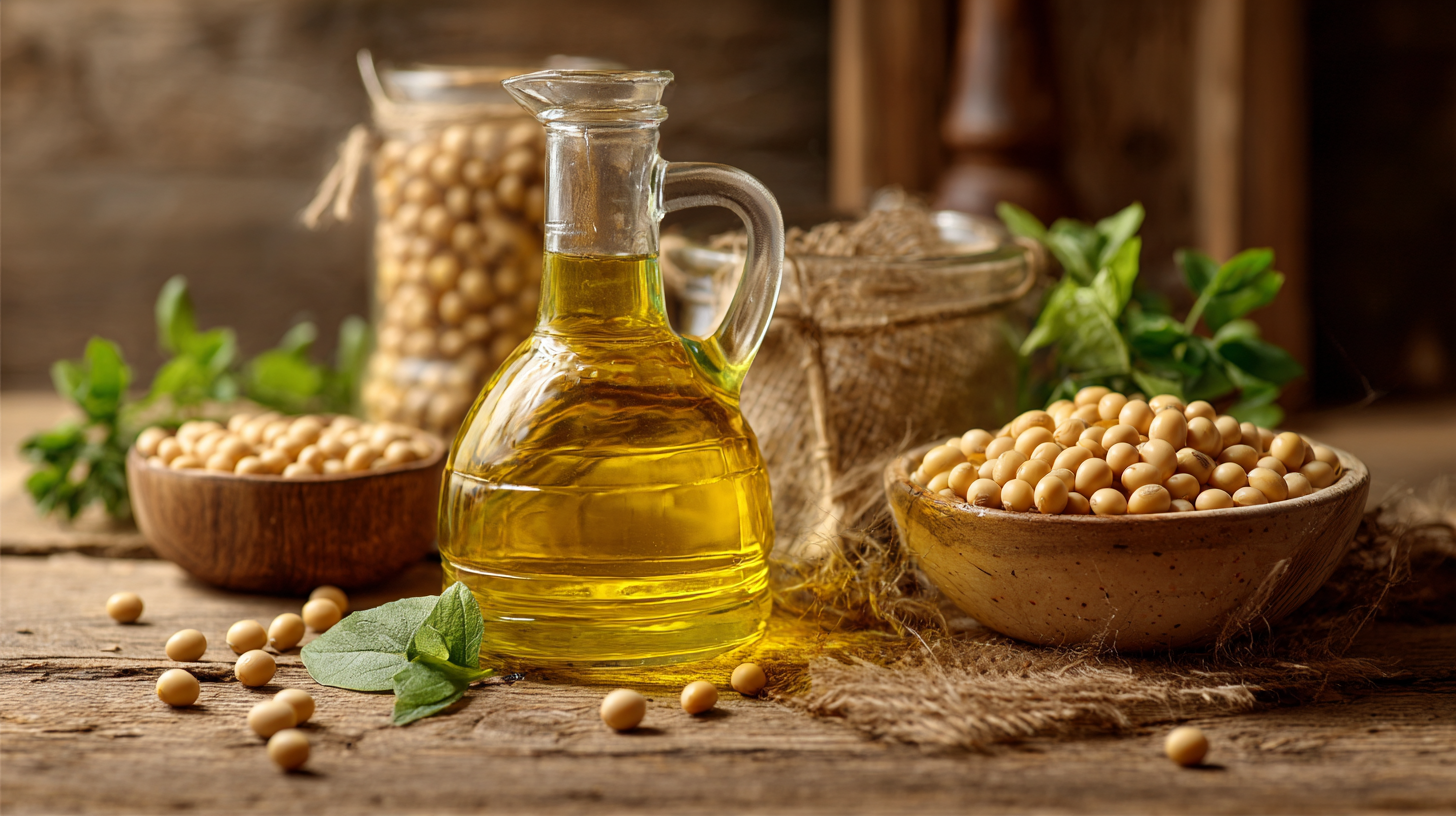
News
How to Incorporate Soybean Oil into Your Daily Cooking for Healthier Meals
 In recent years, the health benefits of incorporating various cooking oils into our daily meals have become a focal point for nutritionists and health enthusiasts alike. Among these, soybean oil has emerged as a nutritional powerhouse, with studies indicating that it contains heart-healthy polyunsaturated fats, including omega-3 and omega-6 fatty acids. According to the American Heart Association, replacing saturated fats with unsaturated fats, such as those found in soybean oil, can significantly reduce the risk of heart disease.
In recent years, the health benefits of incorporating various cooking oils into our daily meals have become a focal point for nutritionists and health enthusiasts alike. Among these, soybean oil has emerged as a nutritional powerhouse, with studies indicating that it contains heart-healthy polyunsaturated fats, including omega-3 and omega-6 fatty acids. According to the American Heart Association, replacing saturated fats with unsaturated fats, such as those found in soybean oil, can significantly reduce the risk of heart disease.
Furthermore, soybean oil is one of the most widely consumed vegetable oils in the world, accounting for approximately 25% of total vegetable oil consumption in the United States, as reported by the USDA. This blog will explore practical tips on how to seamlessly incorporate soybean oil into your cooking routine, making it easier to achieve healthier meals without sacrificing flavor or convenience.
5 Simple Ways to Use Soybean Oil for Healthier Meal Preparation
Incorporating soybean oil into your daily cooking can significantly enhance the nutritional profile of your meals. A recent report from the USDA shows that soybean oil is rich in polyunsaturated fats, particularly Omega-6 fatty acids, which are essential for heart health. One simple way to use soybean oil is by replacing other cooking oils in your stir-frying or sautéing. With a high smoke point of around 450°F, it can withstand high temperatures without breaking down, making it perfect for quick, healthy meals.
Another effective method is to utilize soybean oil in salad dressings. Mixing soybean oil with balsamic vinegar and your favorite herbs creates a delicious dressing that not only tastes great but also provides health benefits. Additionally, a study by the American Heart Association emphasizes that using oils rich in polyunsaturated fats, such as soybean oil, can help lower LDL cholesterol levels, reducing the risk of heart disease. You can also incorporate soybean oil in baking; it adds moisture and enhances the texture of muffins and breads without overpowering their flavors. With these simple adjustments, you can easily make your meals healthier while enjoying the versatility of soybean oil.
Health Benefits of Soybean Oil in Cooking
Top 3 Benefits of Cooking with Soybean Oil Daily
Incorporating soybean oil into your daily cooking can significantly enhance the nutritional quality of your meals. One of the primary benefits of soybean oil is its heart-healthy profile. According to the American Heart Association, it contains a high concentration of polyunsaturated fats, particularly omega-3 and omega-6 fatty acids. These essential fats are crucial for maintaining cardiovascular health, as they help reduce LDL cholesterol levels and lower the risk of heart disease. In fact, a study published in the American Journal of Clinical Nutrition found that substituting saturated fats with polyunsaturated fats, such as those found in soybean oil, can lower heart disease risk by up to 25%.
Another significant benefit of using soybean oil is its rich antioxidant content. Soybean oil is an excellent source of vitamin E, a powerful antioxidant that protects cells from oxidative stress. Research from the National Institutes of Health indicates that adequate vitamin E intake may reduce the risk of chronic diseases, including certain types of cancer. By incorporating soybean oil into daily recipes such as salad dressings, marinades, or cooking oils, you're not only adding flavor but also enhancing the nutritional benefits of your meals.
Lastly, soybean oil is versatile and has a high smoke point, making it ideal for various cooking methods, including frying, baking, and sautéing. With a smoke point of around 450°F, it can withstand high cooking temperatures without breaking down, which is essential for preserving the nutrients in your food. This versatility allows you to enjoy healthier, flavorful dishes while maximizing the health benefits attributed to soybean oil.
7 Delicious Recipes Featuring Soybean Oil for Every Meal
Incorporating soybean oil into your daily cooking can elevate your meals while promoting better health. This versatile oil, rich in polyunsaturated fats and essential fatty acids, makes it perfect for a variety of recipes. Here are seven delicious ways to include soybean oil in your meals, ensuring a healthy and flavorful dining experience.

Start your day with a delightful breakfast by using soybean oil in a veggie-packed omelet. Simply sauté your favorite vegetables in soybean oil for a few minutes before adding beaten eggs. The oil enhances the dish’s flavor while providing a heart-healthy boost.
For lunch, try a refreshing soybean oil vinaigrette over a mixed green salad. Combine soybean oil with vinegar, mustard, and herbs for a dressing that not only tastes great but also supports overall well-being.
For dinner, consider making a savory stir-fry with your protein of choice and a colorful array of vegetables, drizzled with soybean oil to enhance the flavors. Additionally, soybean oil can be a fantastic option for baking; consider using it in your favorite muffin or bread recipes for moisture and a subtle nutty taste.
Remember, when using soybean oil, less is often more, so aim for moderation to fully enjoy its benefits while keeping your dishes wholesome and delicious.
4 Tips for Replacing Other Oils with Soybean Oil in Your Kitchen
Incorporating soybean oil into your daily cooking can be a great way to enhance the health benefits of your meals. Soybean oil is rich in polyunsaturated fats and omega-3 fatty acids, making it a heart-healthy choice. Research suggests that substituting plant-based oils for animal fats, such as butter, can significantly lower mortality risks, particularly when using oils like soybean oil, which has a favorable fatty acid profile. This versatility makes it suitable for various cooking methods, from sautéing to baking.
To successfully replace other oils with soybean oil in your kitchen, consider these tips. First, when deep frying, use soybean oil due to its high smoke point, which is around 450°F. This allows for crisp cooking without the breakdown of beneficial nutrients. Second, in dressings, swap out heavier oils like olive or canola with soybean oil to create a lighter, yet nutritious alternative. Additionally, when baking, you can substitute soybean oil for butter in a one-to-one ratio, maintaining moisture and enhancing flavor without adding saturated fats. By making these simple adjustments, you can improve your meals' health profile and enjoy the benefits of soybean oil in your daily diet.
How to Incorporate Soybean Oil into Your Daily Cooking for Healthier Meals - 4 Tips for Replacing Other Oils with Soybean Oil in Your Kitchen
| Tip | Description | Health Benefits | Usage Example |
|---|---|---|---|
| 1. Baking | Replace butter or margarine with soybean oil in recipes. | Lower in saturated fat, higher in polyunsaturated fat. | Use in cake, muffin, or cookie recipes. |
| 2. Sauteing | Use soybean oil instead of olive or canola oil for sautéing vegetables. | Rich in essential fatty acids and vitamin E. | Ideal for stir-fries and vegetable dishes. |
| 3. Salad Dressings | Make homemade salad dressing using soybean oil. | Promotes heart health due to unsaturated fats. | Combine with vinegar and herbs for a fresh dressing. |
| 4. Marinating | Use soybean oil in marinades for meats and fish. | Enhances flavor while keeping dishes moist. | Mix with herbs and spices for grilling. |
6 Nutritional Facts About Soybean Oil That You Should Know
 Soybean oil is gaining widespread attention not only for its versatility in cooking but also for its impressive nutritional profile. One key fact is that soybean oil is rich in polyunsaturated fatty acids, particularly omega-3 and omega-6, which are essential for heart health. According to the American Heart Association, replacing saturated fats with polyunsaturated fats can reduce the risk of heart disease. Additionally, a study published in the Journal of Nutrition highlights that diets incorporating soybean oil can enhance cholesterol levels by reducing LDL (bad cholesterol) while increasing HDL (good cholesterol).
Soybean oil is gaining widespread attention not only for its versatility in cooking but also for its impressive nutritional profile. One key fact is that soybean oil is rich in polyunsaturated fatty acids, particularly omega-3 and omega-6, which are essential for heart health. According to the American Heart Association, replacing saturated fats with polyunsaturated fats can reduce the risk of heart disease. Additionally, a study published in the Journal of Nutrition highlights that diets incorporating soybean oil can enhance cholesterol levels by reducing LDL (bad cholesterol) while increasing HDL (good cholesterol).
Another significant aspect to consider is soybean oil’s vitamin E content. It is a powerful antioxidant that helps to protect cells from oxidative damage. The USDA reports that just one tablespoon of soybean oil contains about 1.1 mg of vitamin E, offering a beneficial boost to your daily intake. Furthermore, soybean oil is an excellent source of choline, which plays a vital role in brain function and development. The National Institute of Health emphasizes that adequate choline levels are crucial for cognitive health, making soybean oil an excellent addition to the diet for those looking to enhance their meals' nutritional value.
Related Posts
-

Unlocking the Health Benefits of Best Soybean Oil: A Global Perspective on Nutritional Value and Quality
-

7 Essential Tips for Optimizing Your Valaciclovir Hcl Supply Chain
-

Unlocking the Health Benefits of Glutamic Acid in Nutrition and Wellness
-

Explore Global Demand for Ethyl Acetate at the Successful 137th Canton Fair in Guangzhou
-

The Ultimate Guide to Sourcing the Best Phytic Acid: Trends, Benefits, and Market Insights for Global Buyers
-

5 Key Benefits of Valaciclovir HCl: Your Top Choice for Effective Treatment





